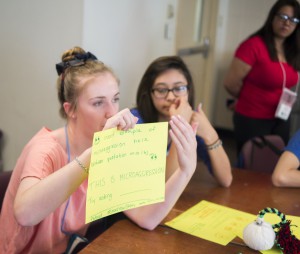Since 2002, The Clubhouse Network hosts a Teen Summit where youth from over 90 member Clubhouses in 19 countries around the world come together and engage in person around their potential to change the world. Each standalone Clubhouse provides a free, creative, and safe out-of-school learning environment where young people from underserved communities work with adult mentors to explore their own ideas, develop new skills, and build confidence in themselves through the use of technology.
Nina Nolan, the Clubhouse-to-College/Clubhouse-to-Career Program Manager with The Clubhouse Network, shares more about the program, and includes voices from attendees of Summits in years past. Afterwards, be sure to read our “Applying the Framework” summary that connects Nina’s story to the Students at the Center Framework.
Through the Clubhouse Network, youth have discovered their individual power to create something new and original, to share their perspective and experience with the world. At the Teen Summit, the youth find themselves in a position to speak about issues they feel are important, and lend their own voice and perspective to these topics.
Participating in the Teen Summit allows the youth to meet others like them, to learn more about issues important to them, and pool their energy, ideas, and tech skills to create something that expresses their hopes and dreams for the possibilities of the future.
The teens come from some of the most underserved communities in their home countries. When they come to the Clubhouse, they are encouraged to express their creativity using state-of-the-art technology. Dunia Basaleh from the Princess Basma Youth Resource Center Clubhouse in Amman, Jordan described a group of youth exploring education. They created a short film about how school would be better if it were more like the Clubhouse—incorporating Clubhouse core values like “following your interests” and “fostering respect and trust” would create schools where students would understand more and students would be more confident standing up to ask questions and not be afraid of another student laughing at them.
The youth don’t shy away from big issues that come up. Walter Velez, a coordinator from the Lawrence Boys and Girls Club in Massachusetts, remembers one particular Teen Summit where there was some nervousness about potentially volatile interactions between youth from Clubhouses in Palestine and Israel. Walter said that on their own, the teens from these Clubhouses connected with each other and then later convened at morning announcements to let the entire group know that everything would be fine between them during the Summit.
In their home country, their behavior might be different, but while in the U.S., they can talk to each other directly and be fine with each other because of their shared Clubhouse experience. They would focus on what they have in common, rather than their differences.
At the Summit, the youth see themselves in a new way, which opens the way to creating new opportunities for themselves when they go home. Spending a week on a college campus, youth from struggling neighborhoods have the opportunity to experience a different environment—a safe place where they can be relaxed and genuine.Teens are often seen crying at the end of the Summit because they don’t want to go back home; Walter takes that opportunity to get them to think about what they can do to change circumstances for themselves and others back home. Some teens have gone on to pursue their dreams of a career in music, or to complete a college education. Dunia said her teens planned and organized a Teen Summit in Arabic so they could replicate the experience for other teens back home.
Authored by Nina Nolan
Applying the Framework:
Looking at Student-owned Learning
- This event centers around students combining talents to create new projects and ideas. Research suggests that when educators create meaningful tasks that connect to students’ prior knowledge and experiences, deeper learning opportunities occur.
- When technology is introduced thoughtfully into a learning experience, these tools not only support the development of 21st-century skills, but also prepare young people for life and work ahead.
- Supporting metacognition and the ability to make sense of other’s cultural and political views is a critical component of civic education and deeper learning. By developing a space for deeper learning with global representation, students can collaborate thoughtfully and develop a sophisticated approach to civic readiness.

